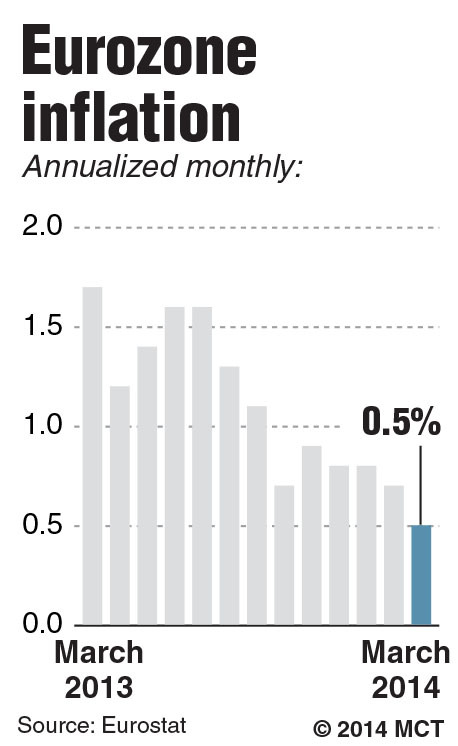
New data released Monday showed the inflation rate fell in March to its lowest level since the 2008-2009 global financial crisis, a sign of economic weakness that piles fresh pressure on the European Central Bank to further ease its monetary policies this week.
Inflation across the 18-country eurozone dropped to 0.5 percent, the Eurostat statistics agency said, down from 0.7 percent in February and below forecasts for 0.6 percent.
The steady decline, the third in as many months, raises concerns that consumer prices may start to fall outright. That risks creating a situation in which consumers and businesses put off purchases in hopes of better deals down the line and companies cut prices to entice buyers.
Such a downward spiral chokes off economic growth and can be difficult to get out of ― Japan was stuck in deflation for two decades.
Aware of such danger, the ECB has said it stands ready to act. However, analysts are divided over whether it will do so at this month’s meeting on Thursday. While some note the ECB has said it does not expect deflation in the eurozone, the new figures might force its hand.
“The ECB may have little option but to take further policy action,” said analyst Ben May of Capital Economics.
In Europe, the inflation rate is the main driver of monetary policy decisions ― unlike in the United States where the Federal Reserve also takes unemployment figures into account. The ECB aims to keep inflation close to but just below 2 percent.
The dip in inflation comes at a time when the euro has been buoyant in foreign exchange markets. A higher currency can push inflation down in two ways: It can make imports cheaper and weigh on economic activity by making exports more expensive on international markets.
Some countries, like Spain, the eurozone’s fourth-largest economy, are already seeing consumer prices fall.
-
Articles by Korea Herald








![[Kim Seong-kon] Democracy and the future of South Korea](http://res.heraldm.com/phpwas/restmb_idxmake.php?idx=644&simg=/content/image/2024/04/16/20240416050802_0.jpg&u=)








![[KH Explains] Hyundai's full hybrid edge to pay off amid slow transition to pure EVs](http://res.heraldm.com/phpwas/restmb_idxmake.php?idx=652&simg=/content/image/2024/04/18/20240418050645_0.jpg&u=20240418181020)

![[Today’s K-pop] Zico drops snippet of collaboration with Jennie](http://res.heraldm.com/phpwas/restmb_idxmake.php?idx=642&simg=/content/image/2024/04/18/20240418050702_0.jpg&u=)